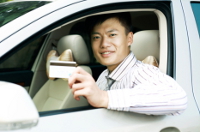The cure for currency shops and travelers checks
By Tim Sullivan

I remember anxiously waiting in line at a rural African bank, hoping they'd exchange the travelers checks I had purchased before leaving the U.S. This was almost a decade ago on my first trip overseas, and it was an uncomfortable introduction to the art of managing money abroad.
Thankfully, my days of travelers checks and dishonest conversion rates have mostly come to an end for one reason: I travel with plastic. Compared to many payment methods, traveling with credit cards is safe, secure and inexpensive. That said, some precautions must be taken. Here's a list of four tips you'll need when heading abroad with your credit card:
1. Get a card with no foreign transaction fees
Using my rewards card while abroad to pay for hotels, car rentals, train fare, eating out and museum tickets is a great way to boost the travel points that may help fund future trips. However, you can easily cancel out those rewards by paying a 3 percent foreign transaction fee on every purchase. There are many cards with no such fees on the market, so make sure you have one in your wallet before you depart.
2. Call your issuer before you leave
Call your credit card company to notify them of your travel plans before your departure. Failure to do so can result in your company's fraud department flagging your account when you try to use it. Having my credit card frozen right after I arrived in Mexico made my first day there miserable. I got sunburned and exhausted as I searched for a place to call my credit card company. In the meantime, I had no access to my funds whatsoever. In addition to calling your issuer before you leave, keep a copy of your card's customer service number in a secure place separate from your wallet in case you lose your card and need to cancel it while overseas.
3. Use you card to minimize conversion losses
I used to hate shopping currency conversion shops, trying to find the one that would get me a few more cents to the dollar. These places stay open by tacking on a service fee for every transaction. Your credit card is designed to work with rates calculated in accordance with the foreign exchange market -- rather than the whims of store owners.
Because many travelers can be baffled by all the conversion rates they have to calculate, some savvy shops have begun offering to convert the price of items to U.S. dollars to make it easier for foreign shoppers. Although this might give you a better point of reference, don't be fooled: This ease is likely to come at a stiff price. If a retail store offers you a price in U.S. dollars, it almost always comes with a high mark-up. Instead, politely decline, check a smartphone app for the correct exchange rate and swipe your card. Also verify that the correct price appears on your receipt afterward.
4. Keep your passport close to your card
I can't tell you how excited I was when Velib', Paris' city-wide bike rental program, came out. I couldn't wait to grab a bike and pedal away for a free first half-hour through my favorite Parisian streets. But when I got to the machine to put down my deposit, I hung my head. Though there is now away around this, when the bike service first came out, the stations only took the European chip-and-pin card. In fact, nearly all European credit cards now use chip-and-pin technology. This makes our magnetic strip cards an oddity over there. However, many retail stores may still take American cards -- if you have proper identification. Having your passport handy will make sure you can still make purchases at these places and save you from an uncomfortable sprint from your restaurant to an ATM.
Credit cards can be your silver bullet in cutting through travel hassles. Having your funds accessible through such a convenient and familiar tool can take away some of the stress of being abroad and help you concentrate on the more important things, such as preparing for your high-stakes business meeting -- or just finding directions to the nearest beach.
January 1, 1970 at 12:00 am